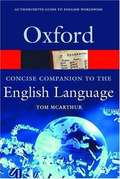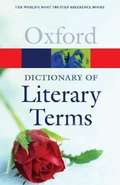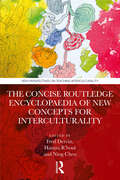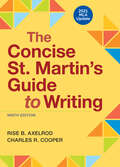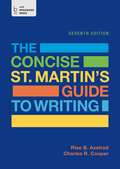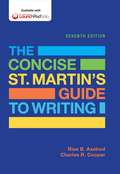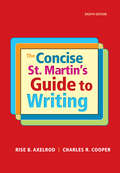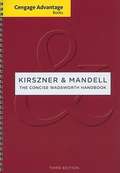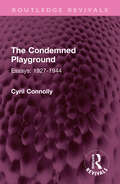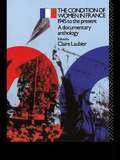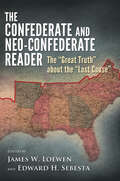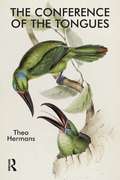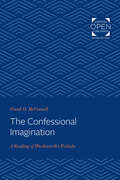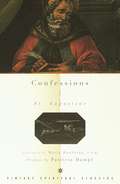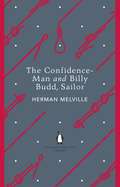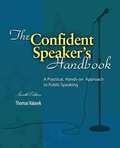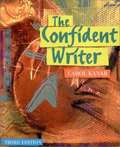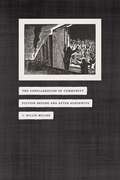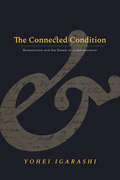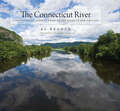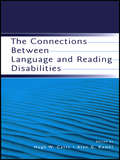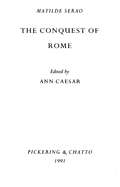- Table View
- List View
The Concise Oxford Companion to the English Language
by Tom McarthurThe Concise Oxford Companion to the English Language provides compact, comprehensive, up-to-date, and easily accessible information about key aspects of ENGLISH at the end of the twentieth century. Among other things, it covers: the distribution and varieties of ENGLISH; its cultural, political, and educational impact worldwide; its nature, origins, and prospects; and its PRONUNCIATION, GRAMMAR, VOCABULARY, WORD-FORMATION, and USAGE. The aim has been to do this dispassionately without being bland, and in a scholarly fashion without being opaque, drawing on and distilling the unique international range of expertise that went into the original full-size Oxford Companion to the English Language (1992) and its abridged version (1996).
The Concise Oxford Dictionary of Literary Terms
by Chris BaldickContains over 1000 of the most troublesome literary terms encountered by students and general readers, with clear and witty explanations of the terms
The Concise Routledge Encyclopaedia of New Concepts for Interculturality (New Perspectives on Teaching Interculturality)
by Fred Dervin Ning Chen Hamza R’boulThis groundbreaking encyclopaedia presents 74 innovative concepts selected and elaborated by multilingual scholars, enriching critical discussions of the notion of interculturality in global scholarship.Many scholars are currently attempting to un-re-think and decolonize interculturality in different fields of research. Although ideas are critiqued and revised, this is happening in very similar linguistic terms as before. These potential attempts to decentre and decolonize could then be put into question. This book argues that knowledge production and negotiation should be exercised through alternative linguistic strategies, not for the sake of sounding different, but to advance new ways of defining, knowing and problematizing. The need to develop concepts in English and other languages is thus promoted in this encyclopaedia.Students, scholars and teachers with a sound background in intercultural studies will benefit most from the book. It will also appeal to anyone wishing to explore new ways of thinking, researching, speaking and writing about interculturality.
The Concise St. Martin's Guide to Writing with 2021 MLA Update
by Rise B. Axelrod Charles R. CooperThis ebook has been updated to provide you with the latest guidance on documenting sources in MLA style and follows the guidelines set forth in the MLA Handbook, 9th edition (April 2021).The Concise St. Martin's Guide provides step-by-step guides to writing and reading to help you learn those essential skills and apply them to all of your college courses.
The Concise St. Martin's Guide to Writing, Seventh Edition
by Rise B. Axelrod Charles R. CooperThe new Concise St. Martin’s Guide provides streamlined coverage of the six most commonly assigned genres in first-year composition—remembering events, writing profiles, explaining concepts, arguing a position, proposing a solution, and justifying an evaluation. The Concise Guide leads students through the writing process: "Guides to Reading" equip students to analyze a genre’s basic features, and Axelrod and Cooper’s distinctive "Guides to Writing" help students apply their analysis of reading to the development of their own writing projects. With more hands-on activities for critical reading and working with sources, greater emphasis on the rhetorical situation, and a fresh new design to show students the strategies they need at a glance, the Concise Guide helps students accomplish their writing goals from start to finish. Our newest set of online materials, LaunchPad Solo, provides all the key tools and course-specific content that you need to teach your class. Get all our great course-specific materials in one fully customizable space online; then assign and mix our resources with yours. To package LaunchPad Solo free with The Concise St. Martin's Guide to Writing, use ISBN 978-1-319-00686-0.
The Concise St. Martin’s Guide to Writing
by Rise B. Axelrod Charles R. CooperThe new Concise St. Martin's Guide provides streamlined coverage of the six most commonly assigned genres in first-year composition--remembering events, writing profiles, explaining concepts, arguing a position, proposing a solution, and justifying an evaluation. The Concise Guide leads students through the writing process: "Guides to Reading" equip students to analyze a genre's basic features, and Axelrod and Cooper's distinctive "Guides to Writing" help students apply their analysis of reading to the development of their own writing projects. With more hands-on activities for critical reading and working with sources, greater emphasis on the rhetorical situation, and a fresh new design to show students the strategies they need at a glance, the Concise Guide helps students accomplish their writing goals from start to finish.
The Concise St. Martin’s Guide to Writing (Eighth Edition)
by Rise B. Axelrod Charles R. CooperThe new Concise St. Martin's Guide to Writing provides streamlined coverage of the six most commonly assigned genres in first-year composition, including remembering events, writing profiles, explaining concepts, arguing a position, proposing a solution, and justifying an evaluation. The Concise Guide leads students through the writing process: Guides to Reading equip students to analyze a genre's basic features, and Axelrod and Cooper's distinctive Guides to Writing help students apply their analysis of reading to the development of their own writing projects. With a new introductory chapter ("Composing Literacy") on writing a literacy narrative, a new assignment chapter on analyzing and synthesizing opposing arguments, and a new chapter on analyzing and composing multimodal texts, the Concise Guide helps students accomplish their writing goals from start to finish.
The Concise Wadsworth Handbook (Third Edition)
by Laurie G. Kirszner Stephen R. MandellThis handbook is THE go-to-guide for every kind of writing. With practical advice on topics ranging from writing effective essays, paragraphs, and sentences to documenting sources and writing in a digital environment, THE CONCISE WADSWORTH HANDBOOK, Third Edition, is an essential tool. The handbook's numerous features--including checklists, "Close-up" boxes, "Grammar Checker" boxes, and marginal cross-references--are valuable navigational tools that will help you understand and apply important concepts to your writing. And, numerous exercises throughout the text allow you to practice at each stage of the writing, revising, and editing processes.
The Condemned Playground: Essays: 1927-1944 (Routledge Revivals)
by Cyril ConnollyFirst published in 1945, The Condemned Playground expresses the author’s personal views on art and literature and the social science. Infinitely entertaining and witty, at times devastatingly destructive and never merely kind, Mr. Connelly has, nevertheless, an underlying note of critical integrity and even moral fervour. This book will be of interest to students of history and literature.
The Condition of Women in France: 1945 to the Present - A Documentary Anthology (Twentieth Century Texts)
by Claire LaubierClaire Laubier brings together documentary and statistical material; extracts from newspapers and journals, literary texts, advertisements, manifestos, and personal testimonies. Each extract relates to the different experiences of women in France at work, in politics, at home and in the family. Together they offer a direct and thought-provoking chronological and thematic account of women's lives in post-war France.
The Confederate and Neo-Confederate Reader: The Great Truth about the Lost Cause
by James W. Loewen and Edward H. SebestaMost Americans hold basic misconceptions about the Confederacy, the Civil War, and the actions of subsequent neo-Confederates. For example, two thirds of Americans—including most history teachers—think the Confederate States seceded for “states' rights.” This error persists because most have never read the key documents about the Confederacy. These documents have always been there. When South Carolina seceded, it published “Declaration of the Immediate Causes Which Induce and Justify the Secession of South Carolina from the Federal Union.” The document actually opposes states' rights. Its authors argue that Northern states were ignoring the rights of slave owners as identified by Congress and in the Constitution. Similarly, Mississippi's “Declaration of the Immediate Causes. . .” says, “Our position is thoroughly identified with the institution of slavery—the greatest material interest of the world.” Later documents in this collection show how neo-Confederates obfuscated this truth, starting around 1890. The evidence also points to the centrality of race in neo-Confederate thought even today and to the continuing importance of neo-Confederate ideas in American political life. The 150th anniversary of secession and civil war provides a moment for all Americans to read these documents, properly set in context by award-winning sociologist and historian James W. Loewen and coeditor, Edward H. Sebesta, to put in perspective the mythology of the Old South.
The Confederation Group of Canadian Poets, 1880-1897
by D.M.R. BentleyAs one of the formative periods in Canadian history, the late nineteenth century witnessed the birth of a nation, a people, and a literature. In this study of Canada's first 'school' of poets, D. M. R. Bentley combines archival work, including extensive research in periodicals and newspapers, with close readings of the work of Charles G. D. Roberts, Archibald Lampman, Bliss Carman, William Wilfred Campbell, Duncan Campbell Scott, and Frederick George Scott. Bentley chronicles the formation, reception, national and international successes, and eventual disintegration (after the 1895 'War Among the Poets') of the Confederation Group, whose poetry forever changed the perception and direction of Canadian literature. With the aid of biographical, political, and sociological analyses, Bentley's literary history delineates the group's political, aesthetic, and thematic dispositions and characteristics, and contextualizes them not only within Canadian history and politics, but also within contemporary intellectual and literary currents, including Romantic nationalism, 'Canadianism', and poetic formalism. Bentley casts new light on the poets' commonalities - such as their debt to Young Ireland, their commitment to careful workmanship, and their participation in the American mind-cure movement - as well as on their most accomplished and anthologized poems from 1880 to 1897. In the process, he presents a compelling case for the literary and historical importance of these six men and their poems in light of Canada's cultural and political past, and defends their right to be known as Canada's first poetic fraternity at a time when Canada was striving to achieve literary and national distinction. "The Confederation Group of Canadian Poets, 1880-1897" is an erudite and innovative work of literary history and critical interpretation that belongs on the bookshelf of every serious scholar of literary studies.
The Conference of the Tongues
by Theo HermansThe Conference of the Tongues offers a series of startling reflections on fundamental questions of translation. It throws new light on familiar problems and opens up some radically different avenues of thought. It engages with value conflicts in translation and the social accountability of translators, and turns the old issue of equivalence inside out. Drawing on a wealth of contemporary and historical examples, the book teases out the translator's subject-position in translations, makes notions of intertextuality and irony serviceable for translation studies, tries to think translation without transformation, and uses a controversial sociological model to cast a cold eye on the entire world of translating. This is a highly interdisciplinary study that remains aware of the importance of theoretical paradigms as it brings concepts from international law, social systems theory and even theology to bear on translation. Self-reference is a recurrent theme. The book invites us to read translations for what they can tell us about translating and about translators' own perceptions of their role. The argument throughout is for more self-reflexive translation studies.
The Confessional Imagination: A Reading of Wordsworth's Prelude
by Frank D. McConnellOriginally published in 1974. This book concerns the archetypal quality of Wordsworth's The Prelude, specifically the ways in which it develops and defines concepts of language, time, and narrative that influenced writers who came after Wordsworth. Frank D. McConnell sees the philosopher and theologian St. Augustine as the most suggestive analogue for the Wordsworthian quest for lost time and for the redemptive power of memory. McConnell maps similarities and dissimilarities between Wordsworth's Prelude and Augustine's Confessions. Each chapter of the book centers on an aspect of Wordsworth's confessional procedure in writing the poem. Chapter 1 ascribes peculiarities in the mode of address to The Prelude's definitive auditor, Coleridge, as a felt presence that shapes the overall form of the poem. Chapter 2 discusses the confessional—and Wordsworthian—view of the human career, contrasting the holistic and organic ideal of man's development with a more ancient and allegorical, or daemonic, view against which the confessional vision struggles. Chapter 3 carries the argument to the more fundamental level of the senses of sight and hearing. And chapter 4 deals with language itself, the irreducible counters of Wordsworth's vision and the highly specialized confessional language of "Edenic words." The general direction of the author's reading is a narrowing of focus from the most general to the most specific features of the confessional act.
The Confessions of Jean-Jacques Rousseau
by Jean-Jacques Rousseau J. M. CohenWidely regarded as the first modern autobiography, The Confessionsis an astonishing work of acute psychological insight. Jean-Jacques Rousseau (1712-78) argued passionately against the inequality he believed to be intrinsic to civilized society. In his Confessions he relives the first fifty-three years of his radical life with vivid immediacy - from his earliest years, where we can see the source of his belief in the innocence of childhood, through the development of his philosophical and political ideas, his struggle against the French authorities and exile from France following the publication of Emile. Depicting a life of adventure, persecution, paranoia, and brilliant achievement, The Confessionsis a landmark work by one of the greatest thinkers of the Enlightenment, which was a direct influence upon the work of Proust, Goethe and Tolstoy among others.
The Confessions of St. Augustine
by Saint Augustine Maria BouldingSt. Augustine managed to compose, over the course of a year filled with exhausting pastoral duties, a strange work he gave the title "my confessions in thirteen books.
The Confidence-Man and Billy Budd, Sailor (The\penguin English Library)
by Herman MelvilleWith an essay by Daniel G. Hoffmann.'Life is a pic-nic en costume; one must take a part, assume a character, stand ready in a sensible way to play the fool'In The Confidence-Man, Melville's unnerving and hallucinatory satire on the American dream, a slippery trickster and master of disguise comes to swindle his fellow passengers - who themselves may also be con-men - aboard a Mississippi steamboat. Billy Budd, Sailor, published after Melville's death in 1891, is a gripping allegory of good and evil, as an innocent man, pressed into service on a British man-of-war, is falsely accused of mutiny. Both these late works are animated with the dark genius of the greatest of American writers.The Penguin English Library - 100 editions of the best fiction in English, from the eighteenth century and the very first novels to the beginning of the First World War.
The Confident Speaker's Handbook: A Practical Hands-on Approach to Public Speaking Fourth Edition
by Thomas ValasekThis book is designed to help you become a better public speaker by presenting a practical, hands-on approach to public speaking.
The Confident Writer (3rd edition)
by Carol C. KanarThe Confident Writer functions simultaneously as a rhetoric with readings, a research guide, and a handbook.
The Conflagration of Community: Fiction before and after Auschwitz
by J. Hillis Miller“After Auschwitz to write even a single poem is barbaric.” The Conflagration of Community challenges Theodor Adorno’s famous statement about aesthetic production after the Holocaust, arguing for the possibility of literature to bear witness to extreme collective and personal experiences. J. Hillis Miller masterfully considers how novels about the Holocaust relate to fictions written before and after it, and uses theories of community from Jean-Luc Nancy and Derrida to explore the dissolution of community bonds in its wake.Miller juxtaposes readings of books about the Holocaust—Keneally’s Schindler’s List, McEwan’s Black Dogs, Spiegelman’s Maus, and Kertész’s Fatelessness—with Kafka’s novels and Morrison’s Beloved, asking what it means to think of texts as acts of testimony. Throughout, Miller questions the resonance between the difficulty of imagining, understanding, or remembering Auschwitz—a difficulty so often a theme in records of the Holocaust—and the exasperating resistance to clear, conclusive interpretation of these novels. The Conflagration of Community is an eloquent study of literature’s value to fathoming the unfathomable.
The Connected Condition: Romanticism and the Dream of Communication (Stanford Text Technologies)
by Yohei IgarashiThe Romantic poet's intense yearning to share thoughts and feelings often finds expression in a style that thwarts a connection with readers. Yohei Igarashi addresses this paradox by reimagining Romantic poetry as a response to the beginnings of the information age. Data collection, rampant connectivity, and efficient communication became powerful social norms during this period. The Connected Condition argues that poets responded to these developments by probing the underlying fantasy: the perfect transfer of thoughts, feelings, and information, along with media that might make such communication possible. This book radically reframes major poets and canonical poems. Igarashi considers Samuel Taylor Coleridge as a stenographer, William Wordsworth as a bureaucrat, Percy Shelley amid social networks, and John Keats in relation to telegraphy, revealing a shared attraction and skepticism toward the dream of communication. Bringing to bear a singular combination of media studies, the history of communication, sociology, rhetoric, and literary history, The Connected Condition proposes new accounts of literary difficulty and Romanticism. Above all, this book shows that the Romantic poets have much to teach us about living with the connected condition and the fortunes of literature in it.
The Connecticut River: A Photographic Journy into the Heart of New England (Garnet Books)
by Al BradenBreathtaking photographs of one of America's most picturesque and historic rivers The photographs in The Connecticut River follow this major waterway for 410 miles, from its origin near the Canadian border to its wide mouth on Long Island Sound, giving us a vivid portrait of a living artery of the New England landscape. Author and photographer Al Braden opens the book with an essay introducing important aspects of the river, and then presents 136 full-page color photos, ranging from close-ups to dramatic aerials, to reveal the river as few people are privileged to experience it. Readers will see and learn about the landscape, history, development, conservation, geologic formations, wildlife, flora, and, of course, the moods of the water, sky, and riverbank. Informative captions provide a wealth of information about the images, from pristine misted mornings to rich valley farmlands and modern hydroelectric turbines. Together, the images and text provide a poignant look at the river and document its centrality to the development of the unique character of New Hampshire, Vermont, Massachusetts, and Connecticut. Includes select bibliography and list of resources.
The Connections Between Language and Reading Disabilities
by Alan G. Kamhi Hugh W. CattsThis is an edited book based on papers presented at a 2003 invitee-only conference under the sponsorship of the Merrill Advanced Studies Center of the University of Kansas. The participants were prominent scholars in the areas of language and reading, and have research programs funded by NIH and other sources. The purpose of the gathering was to discuss theoretical issues and research findings concerning the relationship between developmental language and reading disabilities, specifically looking at neurological, behavioral, and genetic factors. In addition, it discussed other factors contributing to reading difficulties in the middle elementary school years through adolescence and literacy outcomes for children with early language impairments, and how these problems relate to children with dyslexia. The Foreword is written by Reid Lyon, Branch Chief, Child Development and Behavior Branch, NICHD-National Institutes of Health.This book appeals to scholars in the areas of language disorders and reading disabilities, as well as to practicing speech-language pathologists, special educators, and reading specialists. It may also be used in graduate courses designed as seminars in either language disorders or reading disabilities in schools of communication disorders, as well as schools of education--especially special education departments.
The Conquest of Rome by Matilde Serao (Pickering Women's Classics)
by Mathilde SeraoMatilde Serao (1857-1927) was a successful and prolific journalist and novelist. This book tells the story of the arrival in Rome of a provincial deputy from the poor South. It paints a portrait of political and social life in contemporary Rome.
